Abstract
Vineland is primarily concerned with how film, television and computer technologies shape not only contemporary experience but also the novel itself as a literary form that must inscribe and reflect upon the effects these media produce. Vineland offers a Janus-faced view of America in the 1980s: it looks back to a period when social revolution "went blending into commerce" and "the highest state of the analogue arts [was] soon to be eclipsed by digital technology" (VI 308); and it looks forward, on the technological horizon, to a media assemblage in which all information is digital and mediated through the computer interface. In the meantime, Vineland's present is defined by a contemporary media assemblage much like what Friedrich Kittler calls a "partially connected media system."
How to Cite:
Johnston, J., (1994) “An American Book of the Dead: Media and the Unconscious in Vineland”, Pynchon Notes , 20-37. doi: https://doi.org/10.16995/pn.196
Downloads:
Download PDF

